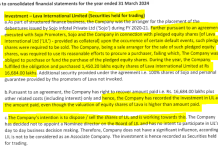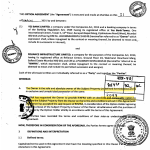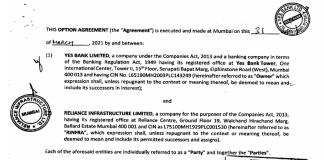With the help of a whistleblower, the Rajasthan police is prosecuting cases of insurance schemes mis-sold by ICICI as fixed deposits to unsuspecting customers. But the country’s insurance and banking regulators don’t seem bothered.

Victims narrate their stories about how they were mis-sold insurance policies. Credit: Insurance Angels

Hemindra Hazari BUSINESS 19/MAR/2018
The nation remains riveted on the ongoing scandal of the Punjab National Bank (PNB) fraud. Government-affiliated economists such as Arvind Subramanian, corporate chiefs, and the business media – not wishing to waste a good crisis – have seized the PNB fraud to push for privatisation of government banks as a solution.
Meanwhile, statutory regulators have been turning a blind eye to the fact that new private sector banks and their life insurance affiliates have defrauded sizeable numbers of vulnerable bank customers.
Officials at ICICI Bank, in collusion with its subsidiary, ICICI Prudential Life Insurance, have been exposed by Nitin Balchandani, a whistleblower, for exploiting customers and mis-selling life insurance policies in Rajasthan. Many of these customers were low-income farmers who were specifically targeted.
It appears that these companies have whole heartedly embraced management guru C.K. Prahlad’s doctrine that corporate profits can be found at the ‘bottom of the pyramid’. Prahlad claimed this would also “bring prosperity to the aspiring poor”. Farmers in Rajasthan might beg to differ.
Apart from this, ICICI Bank and ICICI Pru Life took even educated customers for a ride. The details of how this happened and continues to happen – and more troublingly, how the insurance regulator has done very little to intercede and protect customers – comes from Insurance Angels, a registered entity set up by Balchandani, who is a former employee of ICICI Prudential Life. Insurance Angels assists individuals who have been mis-sold policies in getting a fair settlement from the concerned insurance companies and till date has been able to get refunds for most of the complainants.
The case of Ali Hussain Arif
The case of Ali Hussain Arif (video link in Hindi) ICICI Prudential Life Policy Nos. #****3146 & #****4432 is particularly enlightening, and an example of how brazenly insurance is mis-sold.
Zubeda Bai retired from Hindustan Zinc in 2000. She was at a senior position when she retired. In December 2014, she approached ICICI Bank, Fatehpura branch, Udaipur where she maintained her savings account, in order to open a fixed deposit of Rs 1 million. As she is unmarried, she decided to nominate her nephew Ali Husain Arif in the fixed deposit.
Zulekha Taj was the bank branch manager who interacted with Zubeda Bai. Taj was aware that Zubeda Bai was unmarried and, at 70 years of age, could not be sold an insurance policy. So, Taj asked Zubeda Bai to call her nephew to the ICICI Bank branch.
Ali Hussain Arif was an MBA student in Mohan Lal Sukhadia University, Udaipur, and was 22 years of age. As per IRDAI norms, policies cannot be sold to a student. So Zulekha, in the life insurance policy form, showed Ali Hussain Arif to be a businessman and stated his income as Rs 2 million per annum. Also, as per norms, third party payment is not allowed – but, by using a blank cheque signed by Zubeda, a demand draft was issued (without Zubeda’s permission) from her account and that demand draft was utilised for premium payment in the insurance policy (no. ****3146 issued on December 3, 2014) in the name of Ali Hussain Arif. Such a transaction is technically regarded as money laundering by regulators and hence is prohibited.
In January 2015, one month after the first policy was fraudulently issued, Zubeda was cheated for the second time again, with the same modus operandi. However, in the second policy form (no. ****4432 issued on January 20, 2015) Zulekha Taj mentioned Ali Hussain Arif’s income as Rs 3 million per annum, i.e., Rs 1 million more than in the earlier policy issued in December, 2014. All this while, Zubeda Bai believed that Zulekha Taj was opening fixed deposits in the bank with her funds, and that her nephew was the nominee.
Thus a total of four alleged frauds were committed by ICICI Bank in this case:
One, an insurance policy in the name of Ali Hussain Arif was issued by ICICI Pru Life instead of a fixed deposit in the name of Zubeda Bai in ICICI Bank.
Two, Ali Hussain Arif’s profession was reported as a businessman earning Rs 2 mn per year at a young age of 22 years, when in reality he was a student, who could not be sold an insurance policy.
Three, money from Zubeda’s bank account was utilised for the issuance of a policy in the name of Ali Hussain. This is a third party payment, which is not allowed, and comes under the purview of money laundering.
Four, within the interval of one month, Ali Hussain Asif’s purported income was increased on the forms from Rs 2 million per annum to Rs 3 million per annum, just to make him eligible for the sale of the second policy.
Zubeda filed her complaint to ICICI Pru Life on April 7, 2015. Thereafter ICICI Pru Life rejected her claims regarding mis-selling. Pertinently, on October 29, 2015 she complained via email to Ms Chanda Kochhar, CEO ICICI Bank and one of her questions was:
“Is the bank having any written consent from me to invest my money in somebody else’s name?”
Replying to the question, Ms. Chandramouli Rapolu, from the senior management desk and executive assistant to Ms Chanda Kochhar, gave a startling reply on November 3, 2015:
“The Investment was done only on the basis of the mutual consent and with the background that the same nephew is the nominee in all your accounts and deposits with us.”
The reply by the executive assistant to the CEO, acknowledges that ICICI Bank does illegal business (i.e customer’s funds are used to issue policies in the name of a third party) through “mutual consent”, presumably given orally.

ICICI whistleblower Nitin Balchandani. Courtesy: Nitin Balchandani
This is a violation of regulatory policies, and is technically considered money laundering. Zubeda sent an email to the governor, Reserve Bank of India, with a copy to ICICI Pru Life citing this response. Within hours of its dispatch, she received a call from ICICI Pru Life to the effect that the company was going to refund her premium on both policies, and this was confirmed by an official communication from ICICI Pru Life on November 23, 2015.
Regulator “tried to mislead”
Interestingly, despite the RBI being informed of ICICI Bank’s formal acknowledgement, that too from ICICI Bank’s CEO’s office, that the bank does business by “mutual consent” (ie no formal documentation), it does not seem concerned that a large private sector bank is mis-selling life insurance through fraudulent means.
Zubeda Bai’s case is not an isolated case, Mahaveer Singh Ranawat, additional superintendent of police (Special Operations Group), who conducted the preliminary investigation into the ICICI Bank mis-selling in Rajasthan told The Wire.
“So far, our investigation has revealed fraud and serious violation of IRDAI [Insurance Regulatory and Development Authority of India] guidelines. The bank and the insurance authorities also did not cooperate with the investigation and tried to mislead us. The scale of this fraud is massive.”
This is a damning indictment of not only ICICI Bank but, more worryingly for policy holders, of the insurance regulator. The manner in which IRDAI treated one of its conscientious senior officers who was trying to discipline ICICI Prudential Life is revealing.
IRDAI official’s tenure abruptly terminated
Mahesh Joshi Shantilal, on deputation from a government-owned general insurance company, was the officer on special duty (OSD) – grievance in IRDAI’s Mumbai regional office. In an email dated February 27, 2016 sent to his senior, T.S. Naik, head of the consumer advocacy department and other IRDAI officials to investigate mis-selling by ICICI Prudential Life he tellingly remarks,
“Please review the grounds of the complaint. Such cases are being reported against ICICI in volumes.”
On May 25, 2016, in an email to IRDAI officials to follow-up on another mis-selling grievance pertaining to ICICI Prudential Life he said,
“This one is another alarming incidence which justifies the attention of the Authority. If the facts are correct, in addition to the refund, it calls for Regulatory actions.”
Five days earlier, on May 20, Joshi sent an email to his fellow IRDAI officials pertaining to another complaint against ICICI Prudential Life,
“…it arises out of a series of grievances against ICICI Pru in Rajasthan Region wherein, several most serious irregularities, rather, unfair business practices are noticed by us. The volume of such nature appear to be on extremely higher side and may pose questions against the role of regulator one day.”
The day Joshi was foretelling has dawned. The action IRDAI should have taken against ICICI Prudential Life to protect life insurance policy-holders, it now appears, is going to be taken by the Rajasthan police. One wonders: whose interests was the insurance regulator protecting? It is revealing that Joshi’s tenure at IRDAI was short-lived: he was unable to complete his term there and abruptly had to return to his parent company.
Needless to say, IRDAI did not take any action against ICICI Prudential Life for the rampant mis-selling of insurance in Rajasthan.
Unbearable pressure to meet targets
All these complaints reveal the pressure from senior management at ICICI Bank and ICICI Pru Life to their lower staff to sell life insurance policies at any cost. It appears from these complaints that the incentives offered for meeting and surpassing sales targets and the punishments delivered for not attaining targets for life insurance products compel the lower staff to lie, cheat and mis-sell policies. Such is the pressure that those who fail to meet targets may even be driven to desperate measures.
On October 11, 2017, a local media story reported the suicide of Bhopal Singh, assistant branch manager of ICICI Bank, Badnaver, Dhar, Madhya Pradesh. In his dying statement he blamed his manager for putting tremendous pressure to meet targets for loans to farmers as well as insurance policy targets. In the opinion of this writer, senior management at both companies could not be ignorant of such malpractices by the lower staff and should be held accountable.
The mis-selling by ICICI Bank and ICICI Pru Life was first highlighted by Nitin Balachandani, the whistle-blower who also complained to the IRDAI, RBI, Serious Fraud Investigation Office, finance minister’s office and the prime minister’s office . Regrettably, IRDAI failed to act on his repeated complaints and ICICI Pru Life filed a police case against him for stealing confidential information, and based on this, he was in judicial custody for 30 days. Filing a police complaint against a former employee required the consent of Sandeep Bakshi, CEO, ICICI Prudential Life Insurance Company. The state and ICICI Pru Life failed to provide any evidence to the court of the confidential information that Nitin Balchandani was purported to have stolen. The High Court of Rajasthan at Jodhpur passed its judgment (Serial No. 42, Case No. 1447 of 2017) on January 16, 2018 clearing Nitin Balchandani of all charges and stated,
“there was no justification whatsoever behind the action of the investigating officer to have filed a charge-sheet against the petitioner [Nitin Balchandani] for the offence under Section 420 [Cheating and dishonestly inducing delivery of property] Indian Penal Code.”
The treatment by ICICI Pru Life against their whistle-blower clearly highlights the punitive and vindictive measures the company is willing to adopt. This also serves as an ominous lesson for any potential whistleblowers who might wish to disclose fraud.
Not worth the time of the media, analysts, or regulators
The big media’s role in this sordid episode of systemic mis-selling by ICICI Bank and ICICI Pru Life in Rajasthan is an unflattering commentary on its unwillingness to expose prominent corporates, with their large advertisement budgets. Nitin Balchandani used to mark all major media outlets in his email complaints to IRDAI, but not a single one contacted him to follow-up and pursue the story.
The Hindi language Rajasthan Patrika carried a story (only after the Rajasthan police filed an FIR naming ICICI Bank and ICICI Pru Life). In the English media, it was only The Wire which published the first story. After that story, BloombergQuint released a story, only to take it down a few hours after publication. English business media TV channels steadfastly declined to broadcast the mis-selling and refused to ask any questions pertaining to events in Rajasthan to Chanda Kocchar, ICICI Bank CEO, in Davos amidst the snow.
One can hardly blame brokerage analysts who cover ICICI Bank and ICICI Pru Life for institutional clients for ignoring this development. Their silence is understandable, as much of their time is spent on providing corporate access to their institutional clients; any negative write-ups would lead to the concerned companies blocking them.
To quote Upton Sinclair, “It is difficult to get a man to understand something, when his salary depends upon his not understanding it.” But does the same apply to the two regulatory authorities?
A detailed questionnaire was sent by email to Chanda Kochhar, CEO ICICI Bank & chairperson ICICI Prudential Life Insurance Company and Sandeep Bakhshi, CEO, ICICI Prudential Life Insurance Company and to the office of the chairman and other senior officials at IRDAI but, despite reminders, the emails were neither acknowledged nor replied to by them.
Hemindra Hazari is an independent market analyst.














